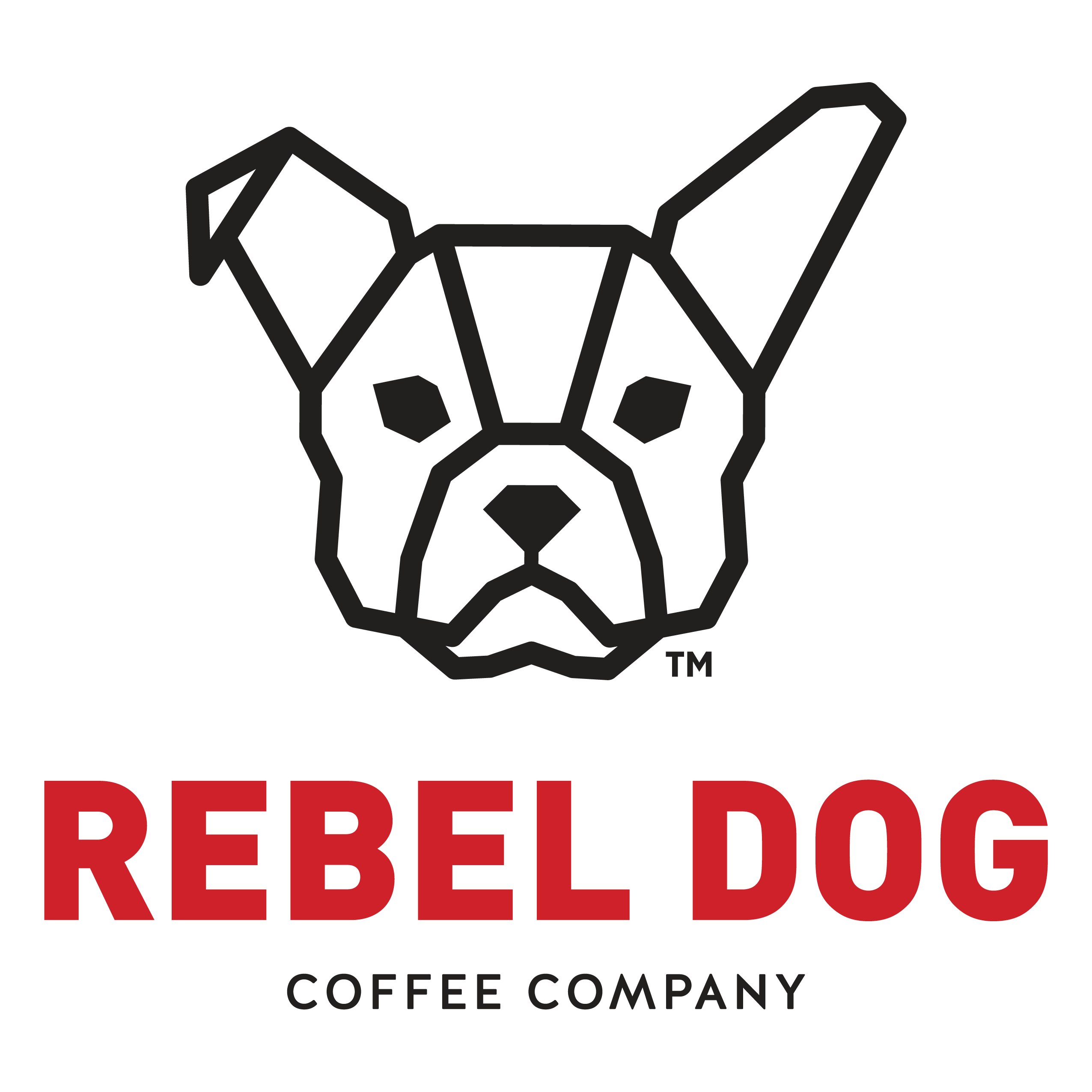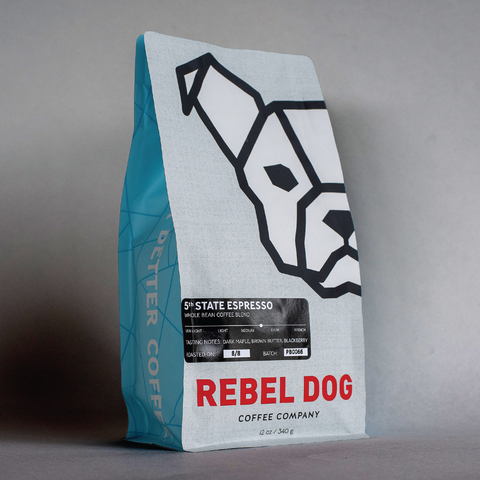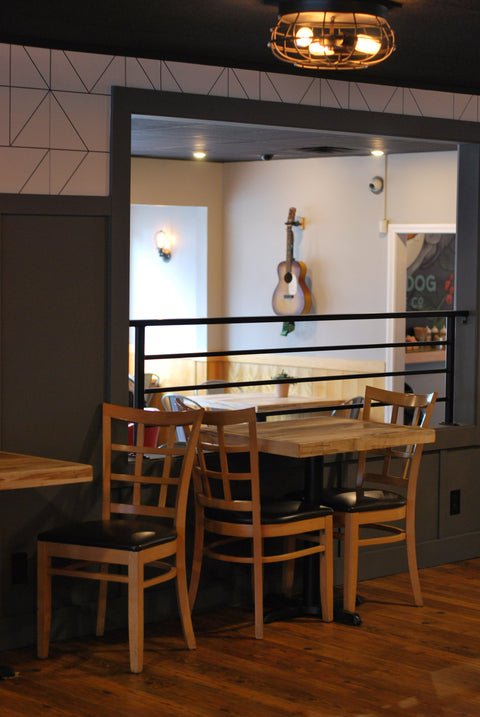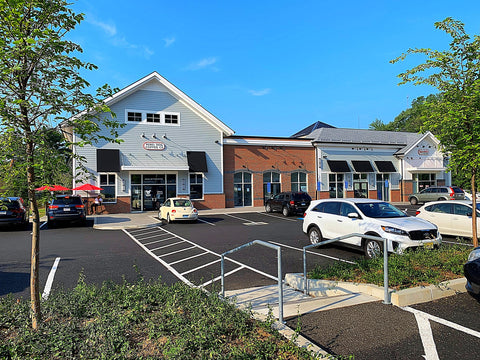What's in 5th State?
Varieties: Bourbon, Catuaí, Caturra
Growing Altitude: 1,300 - 1,900 masl
Processing Method: Fully Washed
This coffee comes from young farmers throughout the Peruvian Andes who belong to Cooperativa Agraria de Jóvenes Pangoa - The Agrarian Cooperative Land of Young People and Women.
Founded in 2015, the cooperative is made up of 109 coffee farmer members, sons and daughters of CAC Pangoa members at its foundation, coming from native communities and migrants from throughout the Andes. Jóvenes Pangoa is dedicated to the production and export of coffee and cacao, with a focus on innovation, sustainability, and inclusion.
Leaders of the cooperative are involved in the entire production process, from harvesting and wet processing to export logistics, ensuring a supply chain without intermediaries. The result is strengthened financial benefits and resiliency, and improved market access, for its members.
With an emphasis also placed on continuous quality improvement and rigorous quality control processes to ensure excellence in every cup, members of the cooperative are producing high-scoring coffees with exceptional sweet, dense beans with notes of fruits, chocolate, and nuts.
You can learn more at https://tierrajovenesymujeres.com/home, and by checking out this presentation.
Varieties: Castillo, Caturra, Colombia
Growing Altitude: 2,100 masl
Processing Method: Washed
Sourced from the elevated terrains of Buesaco Nariño in southern Colombia, this exquisite coffee is cultivated at over 2,000 meters above sea level on average. Buesaco's unique geographic and climatic conditions, characterized by volcanic soil and an average temperature of 18.6 °C, provide an optimal environment for producing coffee with distinct mild taste, high acidity, and sweet notes.
The region’s coffee cultivation heritage dates back to the 18th century, growing over time to become an integral part of the local cultural, economic, and social fabric. With its first international exposure in the early 20th century, Buesaco Nariño's coffee has since been celebrated in the specialty coffee segment worldwide for its unparalleled quality, cultivated in the unique environmental conditions of the region.
As with many coffee origins, it is believed that coffee was first brought to Colombia by priests, arriving, perhaps, within a decade or two after coffee first came to the Americas via the Caribbean in the first half of the 17th century. It was likely a garden crop grown for local consumption and barter for decades. Unlike other coffee regions, we have the story of a priest named Francisco Romero, who could be called the father of commercial coffee cultivation in Colombia. The folkloric tale goes that in the early 1800’s, Father Francisco, hearing confessions in the north eastern town of Salazar de la Palmas, assigned planting coffee to his parishioners as penance for their sins. The Archbishop of Colombia heard about this and ordered all priests to adopt the practice. Commercial production of coffee expanded quickly, moving into regions where the growing conditions were ideal.
Even though it’s been 4,000 years, the soil resulting from the last major eruption of Tolima is still considered “young soil,” filled with nutrients that are no longer found at the same levels in old soil. There is a long list of elements on offer in volcanic soil that are fading or absent in other soils, such as high levels of potassium and nitrogen. Also present is something called “Boron,” which arrived from outer space a long time ago, and is important to cell walls, the creation of enzymes, and the production of flowers and fruit, meaning Boron contributes to yield. Beyond the nutrients, the structure of volcanic soil is also beneficial to coffee growing. It can soak up and hold moisture while, at the same time, facilitate good drainage so water doesn’t pool, which is not good for coffee plant roots. Coffee plants like to take a drink, then take a break. Also, volcanic soils are usually found on an incline, which also helps with drainage.
Varieties: Bourbon
Growing Altitude: 1,500 - 2,000 masl
Processing Method: Natural
This natural process coffee is produced by smallholders in Rwanda who deliver to RWACOF (Sucafina in Rwanda) washing stations.
Smallholders delivering to RWACOF washing stations receive fair prices and agronomic support. They cultivate an average of 200 to 300 trees at altitudes of 1,500 to 2,000 meters above sea level. These high altitudes, combined with fertile soil and good agricultural practices, produce high-quality cherry that is carefully processed at RWACOF stations to preserve and develop these delicious flavors.
In concert with their sustainability partner, Kahawatu Foundation, RWACOF invests heavily in yield improvements, farmer training, quality improvement projects, environmental sustainability and other ways to increase farmer livelihoods.
RWACOF’s Farmer Development Program in partnership with the London School of Economics (LSE) supports farmers with training in Good Agricultural Practices and access to loans, farm inputs and farm services. A new soil health initiative uses soil analysis data that RWACOF collected to identify farms where soil is too acidic. Lime, along with education about application, is distributed to these farmers to help improve soil quality. Additionally, seedling nurseries provide up to 4 million seedlings per year to help farmers renovate their rootstock.
RWACOF also has many projects that are designed to support farmers’ overall livelihoods. They focus on gender equality and support several women’s cooperatives by helping them access land, seedlings and reach a market for their coffees. They offer trainings on financial literacy and alternative income-generating activities.
On the environmental side, RWACOF has worked with partners to help install solar panels at 2 washing stations that are off the electrical grid. RWACOF’s dry mill already have a 50 kilowatt-per-hour solar panel set up on their roof. They’ve also mapped carbon emissions in their coffee supply chain and are starting projects to half their emissions per kg of coffee. Two ways they’re accomplishing this is by facilitating a transition from inorganic to organic fertilizer and further improve waste (water and pulp) management at the wet mills. They’re also working with Trade in Space to map deforestation in the supply chain so that they can begin to work with farmers to reduce deforestation and improve forested areas in the supply chain.
Above all, RWACOF's exceptional attention to detail during post-harvest activities ensures the best quality coffee possible. From the moment cherry enters the washing station until it is milled and bagged for export, RWACOF keeps stringent quality controls in place. They know, as we do, that high-quality coffee is crucial for delivering benefit all along the supply chain.
Varieties: Various
Growing Altitude: 1,070 - 1,200 masl
Processing Method: Washed
This coffee sourced from smallholder famers throughout Nicaragua showcases the Central American profile that’s sweet and nutty with chocolate and citrus.
Nicaragua may not be the most famous producer of Central American coffee, but it has great potential. The country is known as the land of ‘los lagos y los volcanes’ (lakes and volcanos) and has many coffee growing ‘pockets’ that few have heard of or experienced. Many producers in the country are experimenting with new varieties and processing methods, making it a specialty origin to watch.
Many coffee producers in Nicaragua today are buoyed by cooperatives that provide a wide array of services, supports and opportunity. As seen in the win of the ‘El Acuerdo de las Tunas’, where 3,000 landless workers won land rights, collective action by farmers can be far more effective at enacting widespread change than the advocacy of individual farmers.
Cooperatives and farmer associations in Nicaragua encompass a large percentage of the country’s coffee producers, and they are taking their destiny in their own hands. By putting great emphasis on quality and by aiming for the international specialty coffee industry, cooperatives and farmers associations are helping their members gain influence and import that will, hopefully, garner enough profit to enable farmers to continue to improve and invest in their farms and their families.






